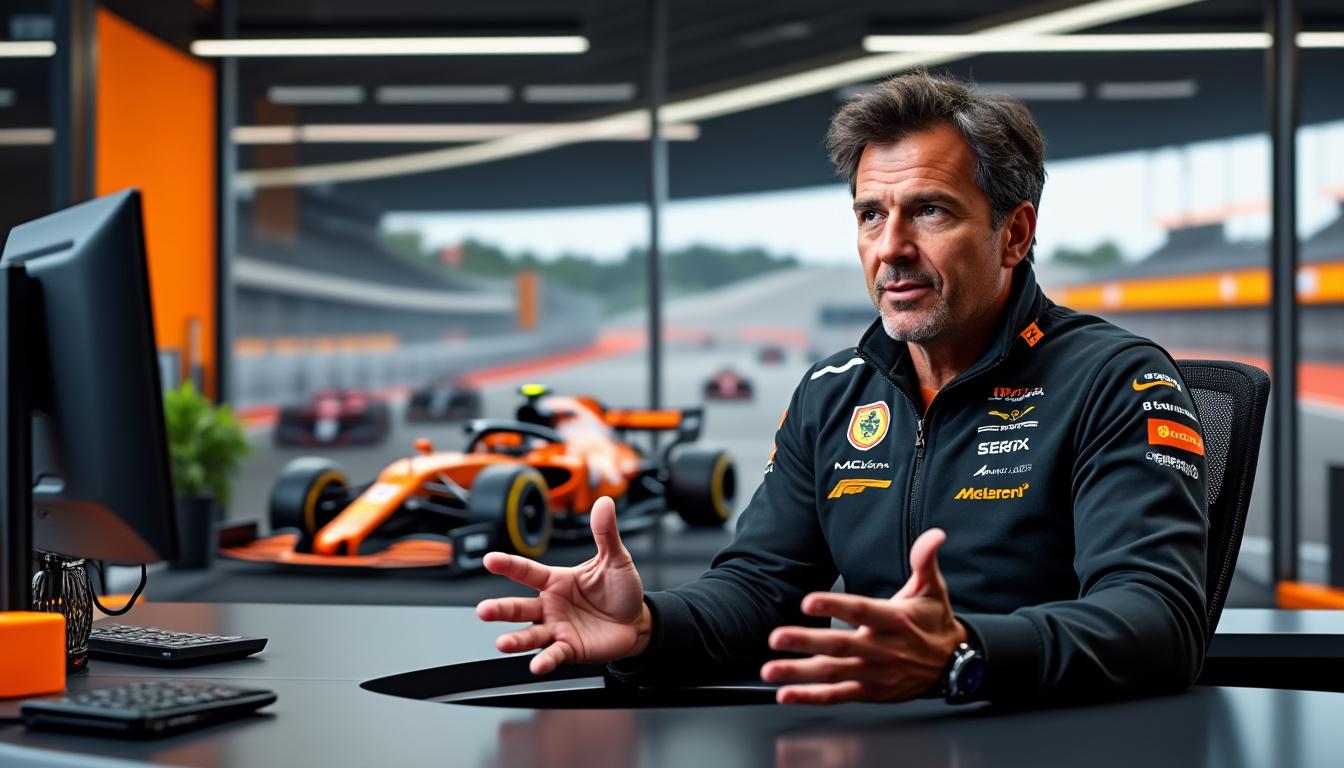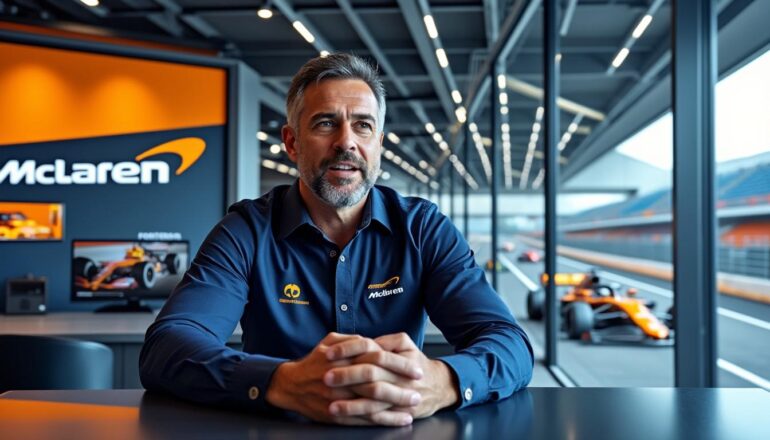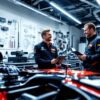In the ever-evolving landscape of Formula 1, Andrea Stella’s journey with McLaren has been nothing short of revolutionary.
His strategic decisions and collaborative spirit have invigorated a team that has long been in pursuit of its former glory.
As he stepped into the role of team principal ahead of the 2023 season, few could have anticipated the impact he would make.
Stella’s leadership has transformed McLaren into a formidable competitor, consistently claiming podium finishes and achieving remarkable milestones. Under his guidance, the team navigated a challenging first half of a season dominated by Red Bull’s prowess, before rallying together to clinch a Constructors’ Championship in 2024. The return to form highlights a meticulous restructuring effort, setting the groundwork for back-to-back titles that seem all but inevitable after a stunning performance of 11 wins out of the first 14 races this season.
Stella’s ethos revolves around cooperation, a quality he considers vital for success in the high-stakes world of motorsport. Collaboratively working alongside CEO Zak Brown, he has built a robust leadership framework, recruiting and empowering top talents from within the organization and beyond. This strategic pivot not only reinvigorated the team spirit but also reaffirmed McLaren’s position as a powerhouse in the sport.

In the world of Formula 1, where speed and precision are paramount, the role of a team leader is pivotal. Recently, a compelling conversation unfolded with Andrea Stella, the team principal of McLaren, who has been steering the team through a remarkable renaissance. His journey, filled with intricate challenges and thrilling victories, reflects the essence of leadership in a high-stakes environment. This piece delves deep into his insights on what it truly means to lead a distinguished institution like McLaren and where he finds the greatest joy in their accomplishments.
What are the key elements of leadership in f1?
Andrea Stella emphasizes the importance of collaboration as the cornerstone of effective leadership. Upon stepping into his role as team principal, he recognized that one individual cannot drive a team towards success alone. In his words, “there’s nothing in this business that you do alone.” This statement encapsulates the foundation of his leadership style, which is centered around building a united front. Teamwork lies at the heart of their strategy, where each member plays a crucial role in contributing to the collective vision of rejuvenating McLaren’s legacy.
To achieve this, Stella initiated a restructuring of the technical hierarchy within the team, introducing a three-pronged structure of technical directors focusing on specific performance pillars. Such a model not only streamlines decision-making but also empowers individual leaders to take ownership of their respective domains. By exploring the natural strengths of his team, Stella has cultivated an environment where innovation flourishes. His philosophy of surrounding oneself with capable individuals who embody collaborative attributes ensures that the right decisions are made collaboratively, not dictated from a single viewpoint.
Stella’s commitment to fostering collaboration often requires difficult decisions, especially in a competitive realm dominated by giants like Red Bull. Yet, he insists that those tough choices are best approached through a collective analysis rather than authoritarian decree. “Decisions normally tend to be just a critical mass of information accumulated,” he notes, underscoring the significance of diverse perspectives in forming effective strategies.
Moreover, Stella believes in the human side of leadership. It is the interpersonal interactions that infuse meaning into achievements, lending a personal touch to the accolades that the team garners. The relational fabric of the McLaren team forms the very essence of their triumphs, where every individual feels a sense of ownership and pride in their contributions.
How has team dynamics evolved under stella’s leadership?
The cultural shift within McLaren has been profound since Andrea Stella took the helm. Growth is not merely a numerical figure on a performance graph; it embodies the evolution of team dynamics. The changes he implemented were born from a comprehensive understanding of the team’s core attributes and capabilities.
Fundamentally, Stella aimed to dismantle previous vertical structures that often led to inefficiencies. By leveraging the talents of existing engineers and integrating fresh perspectives from top-tier competitors, he created a more horizontal and agile team dynamic. This strategy has propelled McLaren into a position where it can regularly contend for podium finishes, redefining their competitive edge in the sport.
Furthermore, Stella actively encourages open communication to foster a more transparent workplace environment. He has instilled a belief that community engagement within the organization leads to tangible improvements. Teams must understand their strengths and weaknesses, and leaders must encourage honest dialogue to facilitate this process. By establishing a culture of feedback, Stella ignites a sense of belonging, igniting the passion of every team member to contribute to the overall vision.
As McLaren redefined its path toward success, it became evident that the synergy among the team members was a crucial driving force. By prioritizing human interactions over hierarchy, Stella has facilitated an atmosphere where creative problem-solving can thrive. This participative approach has revitalized the spirit of the organization, aligning their sights towards achievements once thought out of reach.
What does the future hold for mclaren and andrea stella?
With several podium finishes in the rearview mirror and a promising trajectory for 2024, the future looks bright for McLaren. A first constructors’ championship win in 2024 stands testament to the efficacy of Stella’s leadership. The team is laying the groundwork for a sustained period of success, aiming for back-to-back titles after an impressive run where they managed to clinch 11 victories from the first 14 Grands Prix.
Stella approaches the future with optimism and clarity. His vision is not solely about results but also the legacy that the team leaves behind. He places high value on every individual’s contribution, capturing the sense of collective achievement that accompanies winning titles. “Definitely, contributing to bringing a championship to McLaren has been one of the highlights,” he states, reflecting on the palpable joy that resonated throughout the team following their recent victories.
Moreover, Andrea Stella recognizes that the journey itself often holds more satisfaction than the accolades. The collective sense of progress and growth shared among team members transcends material success. He believes that instilling a culture of joy and fulfillment enhances the overall experience of achieving what once seemed unattainable.
As McLaren navigates the challenges that come with fierce competition, Stella finds reassurance in the unity and tenacity of his team. He acknowledges that while the road ahead may be demanding, the spirit of camaraderie and collaborative spirit will continue to serve as the backbone of McLaren’s upcoming endeavors.
In conversation with Andrea Stella, it becomes clear that true success in F1 is rooted in authentic leadership, a cohesive team, and the shared purpose of creating memorable racing history, fostering not just victories, but meaningful experiences along the way. His vision and commitment to elevating each individual create a powerful narrative that resonates with anyone invested in the journey of this legendary team. For more insights into the evolving dynamics of the F1 world, check out related articles on how collaboration can rescue struggling teams, or explore leadership changes at prominent teams like Ferrari, which constantly seek new ways to optimize their competitive edge.


